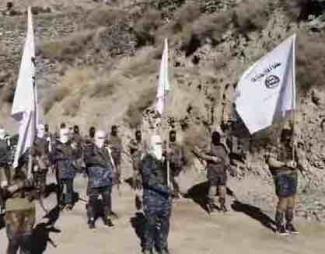Resurgent Taliban Poses Greater Security Challenges for Pakistan
Pakistan has been struggling to cope with a multitude of predicaments ranging from political instability to sectarian intolerance, which often prompts the international community to tag this South Asian nation as a failing state. The homegrown neo-Talibanism in the tribal areas adjoining Afghanistan and Jihadi proxies in areas bordering India continues to pose myriad security challenges for Pakistan’s internal security as well as physical integrity.
To make things worse for the already stressed Islamabad administration, the hardcore Taliban factions under the banner of Tehrik-e-Talban Pakistan (TTP) reemerged from a brief period of quiescence, initiating a series of violent acts against security forces with the ultimate aim to dislodge the democratically elected government and establish a Taliban style Islamic Emirate in Pakistan. Presently, the TTP’s anger is largely directed towards the pro-NATO/US policy of Pakistan’s government.
Plausibly, TTP remains a potent threat to Pakistan’s security. The Pakistani Taliban has been using Afghan soil, especially the northeastern provinces, as both sanctuary and springboard for launching attacks against bordering Pakistan.
The renewed offensive against Pakistani security forces was initiated early this year when TTP militants executed at least 15 security personnel (Frontier Constabulary) in the Mir Ali area of North Waziristan Agency (NWA). This act of violence came in defiance of a deal under the auspice of Shura-e-Muraqba in which five Taliban factions, including the Maulvi Nazeer group, the Haqqani network and the Gul Bahadur group, pledged to abstain from attacking the army, killing and kidnapping civilians in Pakistan. This deal was allegedly engineered by Pakistan’s secret agency (ISI – Inter-Services Intelligence) to minimize militant attacks inside the country. This deal notwithstanding, TTP’s chief spokesman, Ehsanullah Ehsan, confirmed then that their campaign against the Pakistani security forces would continue irrespective of the deal. This renewed TTP offensive was a setback for Pakistan’s establishment as the most dangerous factions of the Taliban had defied the so-called ‘accord’ threatening the overall security within Pakistan.
The attack on Bannu Jail in mid-April this year was orchestrated by Taliban militants. Considered to be the biggest jailbreak in Pakistan in recent times, this has emboldened Taliban militants to vow attacks in other parts of Pakistan, especially Karachi and Lahore prisons and against security installations. Taliban gunmen orchestrated the July 9 attacks on an Army camp near Wazirabad (Gujranwala, Punjab) and the July 12 Ichhra (Lahore, Punjab) attack on a residential building housing police and prison staff. These attacks marked a fresh wave of Taliban violence in the province, which is not considered to be a Taliban stronghold. However, the attacks proved the far and wide reach of the Taliban, which developed the capability to carry out audacious strikes in the heartland of Pakistan over the years.
Soon after, Taliban leaders issued further warnings to step up attacks against Pakistani security and intelligence establishments. TTP leaderships have a reason to justify violence against the Pakistani state as it reopened the border to NATO supply convoys, virtually ending a seven-month blockade.
To that effect, on July 23, a fugitive TTP leader of Swat, Maulana Fazlullah, warned of violence in Pakistan during the holy month of Ramadan. The attacks, according to a Taliban spokesman, would be staged from Kunar and Nuristan provinces of Afghanistan, where TTP leaderships are based now. The immediate objectives, no doubt, are to capture their erstwhile strongholds and to take revenge against Pakistan’s security forces that had successfully pushed the Taliban militants out of Swat (Khyber Pakhtunkhwa) in 2009. The very next day, TTP’s Waziristan chief, Maulana Waliur Rehman, threatened retribution against Pakistan for any military operation against the Haqqani network in and around North Waziristan Agency (FATA). The Taliban are very well aware of US/Pakistan’s military capabilities/alternatives for dismantling the Haqqani network in the AFPak region.
Last but not least, TTP Chief Hakimullah Mehsud, who has been maintaining a low profile to evade predator strikes, came out in the open early this month to order attacks in the Punjab province, targeting intelligence organizations and military facilities, especially the Pakistan Airbase located in Lahore. Mehsud’s war cry against Pakistan resonated a couple of weeks after when TTP militants stormed the Pakistan Air Force’s Minhas base near Attock district of Punjab on August 16. This signals a resurgent Taliban, which is determined to unleash similar high-profile attacks against government and military installations located in major urban centres like Islamabad, Karachi, Lahore and Peshawar.
Intact safe heavens enable TTP to mount brazen attacks on Pakistan’s security forces almost at will. Even though TTP leaderships have admitted this in the past, somehow, it was overlooked by the Afghan and NATO forces. Past experiences have shown that any backdoor negotiation with Taliban factions is nothing more than a paper tiger. Day by day, it is getting amply clearer that Pakistan’s military is planning a major anti-Taliban offensive post-Ramadan in the tribal areas aligned with the US to destroy the safe havens. Any coordinated action that takes place against the Taliban in Waziristan would mark a breakthrough in the US-Pakistan relationship, as Pakistan is averse to aligning with the US against its people, which might trigger civil society backlash. While limited military operations are underway in the Kurram and Orakzai agencies of FATA, the Pakistani military never initiated any offensive in North Waziristan. Of course, the US is carrying out drone strikes in the Waziristan region on its own. However, the most priority target in any joint operation in future would be the deadly Haqqani networks and the Fazlulah-led Taliban along the Pakistan-Afghanistan border.
